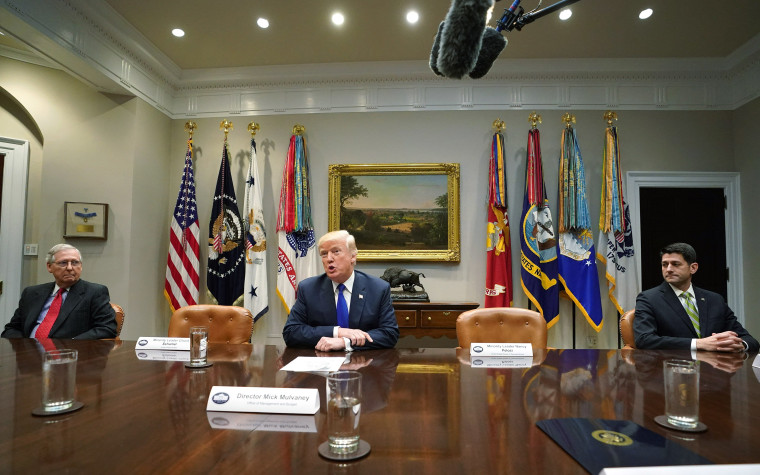Later this morning, Donald Trump is scheduled to announce a rather extraordinary emergency declaration. The Republican president, desperate to construct an unnecessary and unpopular border wall, will grant himself emergency powers, redirect tax dollars away from their intended purpose, and begin a new effort to build a medieval vanity project in defiance of Congress' wishes.
Naturally, there will be litigation. In fact, there will be a lot of litigation. As for whether the courts will tolerate the White House's gambit, as regular readers know, there's been considerable debate of late over whether Trump can reasonably expect to get away with his scheme. NBC News published a good report the other day on where the experts tend to fall on this question.
But the judiciary may not be the president's principal problem, at least not at first. Trump is abusing something called the National Emergencies Act -- a post-Watergate reform measure -- which explicitly offers Congress an opportunity to block a White House action.
At this point, some readers are probably thinking, "So what? The House Democratic majority will vote to stop Trump, at which point the Senate Republican majority will let the bill wither on the vine." In practice, however, it's not that simple.
House Speaker Nancy Pelosi (D-Calif.) will, almost certainly, advance a bill, called a "joint resolution of termination," to curtail the president's plan. At that point, thanks to the specific language of the National Emergencies Act, Senate Majority Leader Mitch McConnell (R-Ky.) will have no choice but to hold a vote of his own. The Washington Post's Greg Sargent recently explained:
Elizabeth Goitein, who has researched this topic extensively for the Brennan Center for Justice, tells me that if Pelosi exercises this option, it will ultimately require the Senate to vote on it in some form as well. The NEA stipulates that if one chamber (Pelosi's House) passes such a resolution, which it easily could do, the other (McConnell's Senate) must act on it within a very short time period -- forcing GOP senators to choose whether to support it.Alternatively, Goitein notes, the Senate could vote not to consider that resolution or change its rules to avoid such a vote. But in those scenarios, the Senate would, in effect, be voting to greenlight Trump's emergency declaration.
And it's at that point where this is likely to get even more interesting.
The Washington Examiner, a conservative outlet, published a piece a couple of weeks ago noting that Senate GOP leaders expect "several" of their members to "join with the Democrats to block Trump from declaring an emergency." The article added, "A second Republican senator, speaking on condition of anonymity, predicted the president would suffer major defections if a vote on a resolution of disapproval is held."
Enough to override a presidential veto? We'll soon find out.
To follow contemporary politics closely is to realize that many GOP officials are willing to balk at Trump's radicalism, right up until it counts, at which point they promptly duck their heads and fall in line. It's possible, of course, that Republicans will do exactly that once more as the process unfolds in the coming weeks.
But don't discount the possibility of significant GOP defections on this issue. Republicans have spent quite a bit of time lately urging Trump not to pursue the emergency-declaration course. In fact, many in the party have warned the White House that the party will struggle mightily to remain united if the president follows through on this.
What's more, as this fight plays out, Democrats will link arms against this radical power-grab, while Republicans argue among themselves over a policy they've already admitted is a horrible idea.
One of Trump's core problems with his government-shutdown gambit is that he picked a fight that united his opponents and divided his allies. Today, the amateur president will make the same mistake again.
